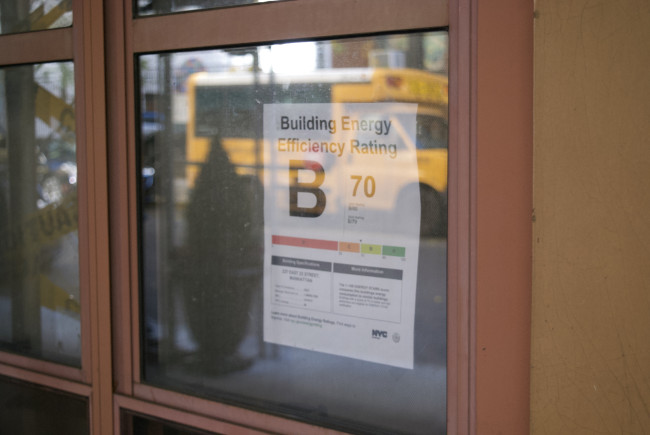- Solicit at least three offers from recognized laundry room vendors
- Ask for reliable references from property management firms and other boards
- Always have the building's attorney review contract terms before signing

Laundry rooms add value in NYC co-ops and condos, but not all laundry room vendors provide the same quality of equipment or service.
Torsten Asmus via Getty Images
If your board is looking for a new laundry room vendor for your New York City co-op or condo building, it usually indicates dissatisfaction with the current company. Given that these contracts last (on average) seven to 10 years, entering a relationship with another vendor should be done with the utmost care and consideration.
Start by asking your property manager to select a company that ticks the right boxes for equipment, technology, service, and reputation. Your building's attorney should conduct essential due diligence in reviewing the contract before you sign the dotted line.
Know, too, that your choices are limited these days given the consolidation of vendors in the city.
"There are only a handful of companies that I am aware of and they all are basically the same," says Arik Lifshitz, CEO of DSA Management, adding that you can choose your payment options and some other factors, but there is very little variability among vendors. (As a former commercial laundromat owner, he should know.) He has worked with Hercules, SEBCO, and CSC Service Works.
Adam Frisch, senior managing director at Mantus Real Estate, agrees, saying there are only three or four well-regarded companies in NYC. "It's not something I deal with that often but it's about going to each company and getting quotes and seeing where you feel the most comfortable."
That's why the contract becomes the critical dealbreaker, and the test is whether the company will take a seat at the bargaining table.
"Most vendors will present their own contract, and then there will be a degree of negotiation," says Scott Greenspun, an attorney at Braverman Greenspun, a NYC real estate firm specializing in cooperative and condominium law.
Hands down, service is the linchpin of any laundry room arrangement, thus putting explicit expectations in the contract around repairs, replacement, and routine maintenance is a must, real estate attorney Jeff Reich, a partner at NYC-based law firm Schwartz Sladkus Reich Greenberg Atlas.
These and other potential issues are all addressed in the following guide. It's a good idea to solicit three or four bids for comparison's sake—and to increase the odds of landing a reliable company. Doing so will take more time and effort in the short term but could save your board (and residents) much frustration in the long haul.
Read the reviews
"As with anything these days, you probably want to look at online reviews and see what their maintenance requests have been like," Frisch says. "I would be less impressed to read that they came and fixed something whenever it broke than that nothing ever broke in the first place. To me, it's not a good thing when a machine breaks down five times a year, which could signal that it's a smarmy cash cow for people to come and charge for repairs."
Besides the Better Business Bureau, check the company's Facebook page or Google reviews. (For example, a search for SEBCO turned up mixed reviews on Yelp and Birdeye.)
Keep in mind these reviews tend to come from end users/residents and not boards or management companies—and that people generally only post reviews to complain and not to praise. But this can be a helpful piece in the bigger interlocking puzzle of information.
Ask for references
A laundry room vendor is no different from a contractor or other provider who will be performing services in your building. Therefore obtaining reliable references is critical.
Interview management companies and other boards who have dealt with the company. Is the vendor prompt in making service calls? Does it properly maintain its equipment? Does it replace obsolete equipment or attempt to keep machines running long beyond their useful lives?
Case in point: Lifshitz is seeing a shortage of manpower across the industry.
"All the companies we work with seem to be short on maintenance staff, and repair jobs are taking longer to complete," he says. But despite being generally dissatisfied, he says he isn't sure the situation would improve by switching companies because everyone is experiencing the same problems. (DSA works with a few different vendors across its portfolio of buildings, pretty much with the same complaints.)
Read the contract carefully
Or rather, have your building attorney review the contract for typical pitfalls. All attorneys Brick spoke to said that boards should never (ever) sign or even work off of agreements prepared by the laundry room vendor, which are written in their favor and typically include hidden renewal clauses in seemingly unrelated provisions that preclude a way out of the contract.
"It's the classic case of are you going to pay me now or a lot more later?" says Dean M. Roberts, a real estate attorney at Norris McLaughlin.
What's more, don't be seduced by monthly fees or renovation packages; there are more important contract terms that must be addressed.
"The numbers can be big but what many boards don't realize is that you don't make a lot of money on a laundry contract when you factor in the cost of utilities and water," Roberts says. "People focus on the rent but it's really an amenity and the quality of the service is the driver, so that's why I focus much more on the service side of the contract."
1. License vs. lease: Traditional laundry room contracts are structured as a lease whereby the company pays the building a fixed monthly fee. But Reich always advises going with a license contract, finding it to be a more accurate document than a lease agreement in reflecting the relationship—the vendor is not on the premises other than for repairs. It's also easier to evict a licensee than a tenant, so it has the added benefit of making it easier to have them removed if you terminate the license. "You don't want to get in a situation where you're afraid to remove the equipment if they refuse to do so."
Either way, Greenspun says the contract should specify how the rent will be calculated, or that the license fee is very clear.
2. Term length: The typical contract term is for five to eight years. Depending on your building's needs (say, you are planning a major renovation of the basement at some future date), you may want to go with something shorter, but typically nothing less than five years—it just doesn't make financial sense for a company to contract for anything less than that. And a board would be wise not to contract for anything longer without a clear and incontrovertible escape clause should things go awry. (Lifshitz says the term length is often negotiated.)
3. Quality of service: Essentially Roberts says you want to hold the company to a very high standard of service and to be specific about the time frame within which repairs must be made—that could be within eight hours on a business day, and maybe two or three days if on the weekend. There are companies that are less good about making repairs than others.
"One thing we try to negotiate and companies push back hard on this is putting language in the contract that states that if a machine has been out of service multiple times—say, three times in 30 days—it must be replaced," Reich says. "It's been an issue for our boards in the past—it seems when you have an old or bad machine, there comes a time when it needs to be replaced and we try to negotiate that upfront before signing the contract."
Greenspun encourages specifying that you are getting brand new equipment, not refurbished—and that if there is a lemon, under what circumstances can you require replacement of broken equipment.
Lifshitz insists on new machines—"that’s a non-starter."
Then there's the shift toward smart technology where smartphone apps are replacing card-operated machines, so if that's important to your residents, you may well want to find a company that can offer the latest technology.
4. Termination clause: Make sure the agreement is clear about circumstances under which the building can terminate the contract in case of a breach, Greenspun says.
"Many vendor contracts do not provide a way out other than loose obligations such as making a certain number of repairs within a certain amount of time, with no way to end the contract if the vendor fails to do these things," Reich says.
"If not reviewed properly, you can end up with a contract that is hard to terminate and can leave you with a company that knows it is not being renewed, which results in periods of poor service," Roberts says. For that reason, he inherently tries to put in an escape clause but finds that most companies don't allow it unless you are in a building with more economic leverage (so Co-op City vs. a 12-unit building in Canarsie).
What's more, there's often language that says the board agrees that it will not remove or interfere with the use of the machinery until a final judgment, and in NYC lawsuits can drag on for many, many years. "Given the value of these contracts, it doesn't make economic sense to bring a lawsuit, so you're stuck without a remedy. So we negotiate an appropriate termination provision."
Relatedly, Greenspun encourages having a clear dispute-resolution policy (litigation vs. mediation). And that the vendor will cover attorney fees if the building prevails. Roberts says laundry room companies have not been traditionally been open to mediation but he's seeing that because it's a useful tool and a more friendly forum.
5. Automatic renewal: Although Reich says it's less common these days, vendor contracts often bury language in unrelated clauses whereby the contract must be affirmatively terminated within 90 or 120 days of the end of the term or it would automatically renew. "So if someone is asleep at the switch, and it's easy to be asleep at the switch, that can mean being stuck in another multi-year contract," he says.
At the end of the term, the vendor contract might automatically continue on either a month-to-month basis or for an extended period of time. Greenspun says he prefers to go with a month-to-month situation. "You don't want to be in a situation where for whatever reason you miss that 30-day notice and end up with, say, two more years."
Roberts agrees—he's seen contracts that say it will renew for as long as seven years "if you don't send notice on the third Tuesday of the fourth month of a full moon" (or other "insane" notice provision).
6. Right of first refusal: Make sure to strike out this evergreen clause, which basically says that at the end of the term, a board must present other bids to the vendor and if it matches that bid it gets to keep the contract.
"If you went and solicited bids from other vendors, you couldn't just sign the best deal—you'd have to give the existing vendor an opportunity to match or beat it," Greenspun says, adding that in the majority of instances, a board is considering using another vendor because it is unhappy with the current one.
Roberts says he never gets pushback on this point: "Most vendors are smart enough to know that if the board is so peeved that they've found another vendor, it's not a relationship they want to be in anyway."
And as Reich explains, this contract is not about the dollars, it's about the service, so just because a vendor would be willing to match the economics of another company's deal doesn't mean it will match the level of service. Instead, he says a board could include a right of first offer in the contract such that the vendor would have to come to you with their best renewal bid rather than sitting back and waiting to see what other offers you've had to obtain. And the beauty of the right of first offer is that the board is not obligated to accept it.
7. Fee sharing: Roberts says he always looks for the presence of a "fee sharing" provision, as that is always a source of problems. Who does the accounting of the revenue from the machines and how is it computed? I recommend the simplest formulas possible, i.e. fixed trigger amounts and clear guidelines on the measurements.
Reich agrees that profit sharing is not recommended because the company could keep two sets of books.
8. Insurance coverage: Reich points to standard language where each party agrees to maintain commercially reasonable insurance and sometimes he will specifiy what that is. For sure, the building and managing agent should be additional insureds on a vendor's policies. "Before entering the agreement, the board should have its insurance broker review the vendor's policy for adequate coverage and to ensure there is no exclusion for labor law claims," Greenspun says.
He also advises find out whether the vendor uses subcontractors to do any service work, and if so, make sure they are covered as well. "Get an indemnification from the vendor and any subs and strike out any obligations for the building to indemnify the vendor."
9. Capital contribution: Frisch says most companies are willing to agree to paint and otherwise update the laundry room if and when that is deemed necessary by the board. And Roberts says most of the time companies include some type of deal sweetener like remodel the space, install a TV screen, supply new furniture, etc.
10. Changes in building needs: Roberts tries to bake a clause into the contract that says the company will cooperate with changes in shareholder needs, such as if more families are moving in and you need bigger machines. "You can't force them to do it, but it's in their best interest because they want people to use the machines."
Negotiate with the vendor
Armed with the attorney's feedback, it's time to work through the terms with a potential vendor.
On the bright side, both Greenspun and Reich report that most companies are amenable to changes. "We are usually able to reach language that's fair to both parties; the vendor gets notice and an opportunity to cure, but ultimately there is a hammer the board can use if the vendor doesn't live up to its obligations," Reich says.
And if they balk? Greenspun says you can at least go back to other bidders.
Keep your constituents in mind
According to Reich, the majority of boards are looking for convenience for their residents. For example, one of his client-buildings was recently looking at their agreement, "which was awful and paid the building very little," but the machines only charged $1.25 or $2.50 a load, and that's what they cared about. They weren't looking to get maybe $20,000 a year on the contract but rather to save everyone in the building money."
He said that quality of life issues were also important—they wanted the room to be painted and redone with quality finishes and to have folding tables and carts.
And BTW, Frisch suggests abandoning a common laundry room altogether: "Through the years, I've seen the value of having a laundry room in the basement of a building in the city decline, especially in a lower-end building with smaller apartments when people might prefer to use wash-and-fold services that are reasonably priced and deliver." He does see value however in higher-end buildings where there are families with young children.
"But then it might make more sense to install machines in the units. Of course, that will cause a large increase in water usage and a one-time capital expense in buying the machines and installing them, so it becomes a matter of knowing your shareholders—will they balk at an increase in maintenance fees, even though it would increase the value of their apartments when it's time to sell?" (Food for thought.)
You Might Also Like
Sign Up for our Boards & Buildings Newsletter (Coming Soon!)
Thank you for your interest in our newsletter. You have been successfully added to our mailing list and will receive it when it becomes available.






















